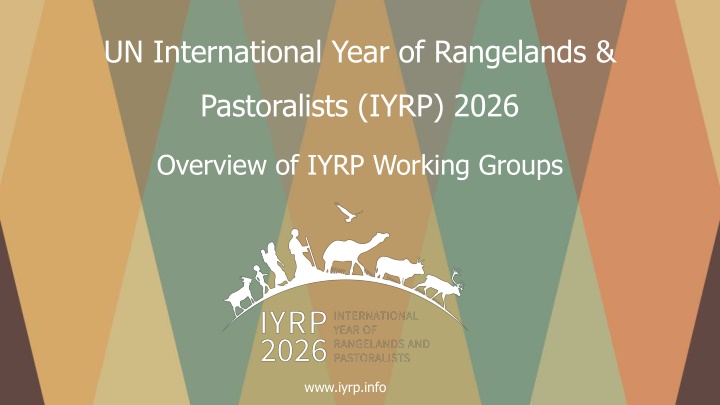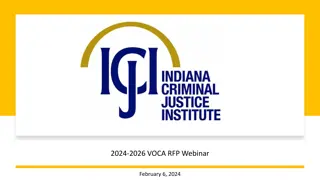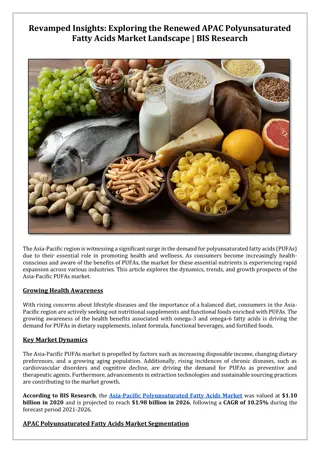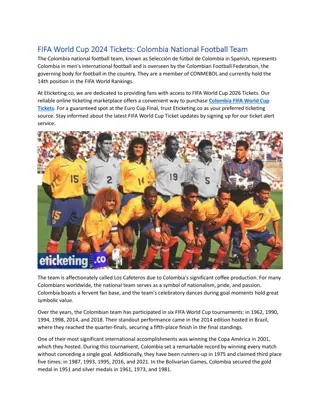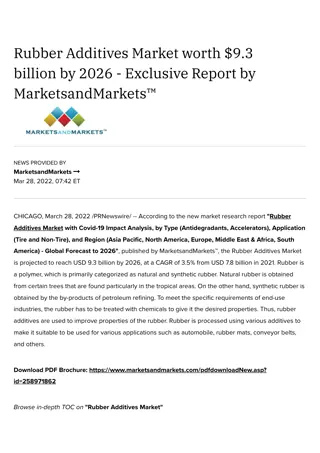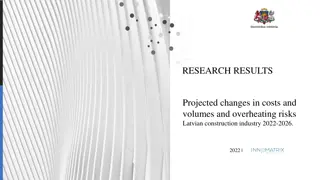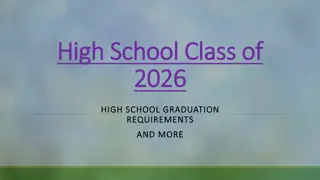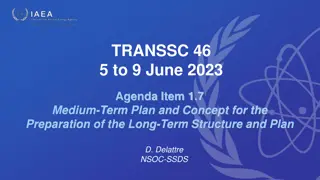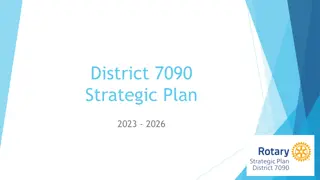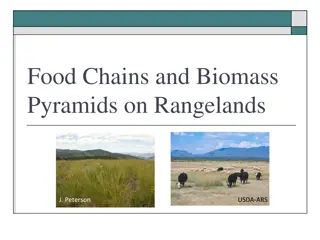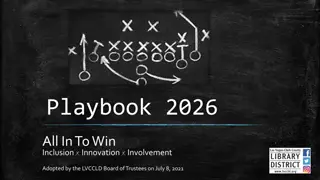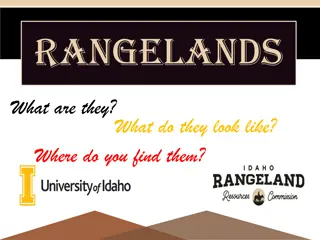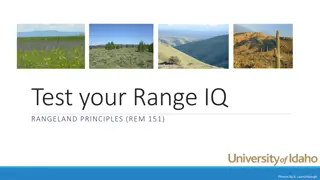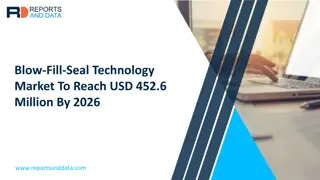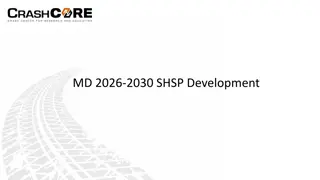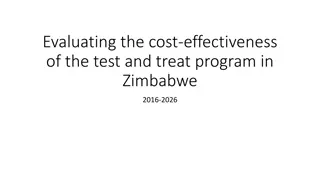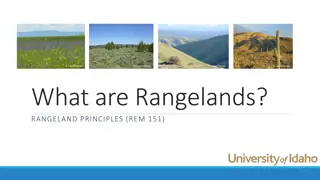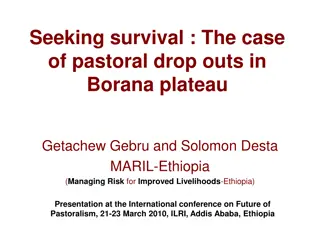UN International Year of Rangelands & Pastoralists 2026: Working Group Overview
The UN International Year of Rangelands & Pastoralists (IYRP) 2026 initiative aims to raise awareness about the contributions of rangelands and pastoralists to food security, economy, environment, and cultural heritage. The Working Groups focus on various themes such as afforestation, mountain pastoralism, gender, water, land degradation neutrality, biodiversity, economics, youth, land tenure, and commons. The objectives include advocating for sustainable management policies, facilitating ethical investments, and influencing global resolutions in support of rangeland resources.
Download Presentation

Please find below an Image/Link to download the presentation.
The content on the website is provided AS IS for your information and personal use only. It may not be sold, licensed, or shared on other websites without obtaining consent from the author.If you encounter any issues during the download, it is possible that the publisher has removed the file from their server.
You are allowed to download the files provided on this website for personal or commercial use, subject to the condition that they are used lawfully. All files are the property of their respective owners.
The content on the website is provided AS IS for your information and personal use only. It may not be sold, licensed, or shared on other websites without obtaining consent from the author.
E N D
Presentation Transcript
UN International Year of Rangelands & Pastoralists (IYRP) 2026 Overview of IYRP Working Groups www.iyrp.info
Outputs of the Working Groups will feed into the 12 themes that actors shall engage with during the IYRP (one theme per month).
Working groups agreed to date 1. Afforestation in Rangelands 2. Mountain Pastoralism 3. Pastoralism & Gender 4. Pastoralism & Water 5. Rangelands & Land Degradation Neutrality 6. Rangelands & Biodiversity 7. Economics of Pastoralism 8. Pastoralist Youth 9. Pastoralist Land Tenure & Commons
What does the IYRP initiative seek to achieve through the Working Groups? Greater awareness in science & society about how rangelands & pastoralists contribute to food security, economy, environment & cultural heritage Resolutions taken by UN and other international entities in support of rangelands & pastoralists Changes in national, regional & global policies in favour of sustainable management of rangeland resources by pastoralists & other stakeholders Increase sustainable & ethical investment in rangelands & pastoralist livelihoods
Possible tasks of Working Groups (WGs) related to their respective themes: Collate and analyse existing research results (science review) Identify knowledge & information gaps and new opportunities Stimulate and engage in participatory research to fill gaps and explore opportunities Analyse existing international policy related to the theme Identify targets (international bodies, conventions, events etc.) for science- and experience-based advocacy Strategise on right messages for these targets, including identification of spokespersons or ambassadors to bring them across Engage with pastoralists and others in IYRP network (including other WGs) in disseminating these messages, also for public awareness
Group 1: Afforestation in Rangelands Coordinators: David Briske (Texas A&M University, USA) and Susi Vetter (Rhodes University, South Africa) Status: Rangeland afforestation is not a natural climate solution state-of- the-science evidence-based paper submitted for publication Headline message: Rangelands are valuable ecosystems and afforestation efforts, driven by a climate change mitigation agenda, present a serious risk. Group 2: Mountain Pastoralism Coordinators: Igshaan Samuels (IYRP) and Eric Chavez (FAO) Status: Policy brief on Sustainable Mountain Pastoralism under development
Group 3: Pastoralism & Gender Coordinator: Nitya Ghotge (ANTHRA, India) Status: WG has convened several times and recruited additional members Activities: Highlight the advantages of bringing a gender lens to pastoralist policy & development Disseminate key information around gender & pastoralism and generate discussions on this topic with a view to raise/increase awareness Identify gaps in research on gender & pastoralism Support the other WGs in their efforts to incorporate a gender lens into their work Make sure gender issues receive adequate attention in the IYRP 2026 Concept note posted on the IYRP website.
Group 4: Pastoralism & Water Coordinators: Adrian Cullis, Michael Odhiambo & Kerstin Danert Status: Launched after webinar on pastoralism & water held in June 2022 by RWSN (Rural Water Supply Network), CELEP (Coalition of European Lobbies for Eastern African Pastoralism), IWMI (International Water Management Institute), SIMVI Foundation & Skat Foundation Focus on water governance as well as water-related ecosystem services and rangeland land & water management A concept note is posted on the IYRP website.
Group 5: Rangelands & Land Degradation Neutrality (LDN) Coordinators: Bora Masumbuko (IUCN) & Mounir Louhaichi (ICARDA) Status: Science review Global action for sustainable rangelands and pastoralism to achieve Land Degradation Neutrality is under final editing. Focus on the UN Convention to Combat Desertification (UNCCD) with two critical issues for raising awareness within the UNCCD process: The value of rangelands and pastoralism Conversion of rangelands The WG will undertake research and analysis, conduct case studies and disseminate knowledge products in the form of policy briefs, animated videos, webinars etc. A concept note is posted on the IYRP website.
Group 6: Rangelands & Biodiversity (under development) Coordinators: Rashmi Singh & Matthew Luizza Status: Concept note developed and to be shared with the network to stimulate the creation of a WG Focus on Biodiversity and Ecosystem Services Group 7: Economics of Pastoralism (under development) Coordinator: Serena Ferrari (CIRAD, France) Valuing pastoralism (contribution to GDP, imports & exports of pastoral products, etc.) Competition at national level between pastoral products and industry-sourced products Constraints that pastoralists face in marketing their products Sustainable production & consumption
Group 8: Pastoralist Youth (under development) Coordinator Caroline Ruto (Kansas State University) Draft concept note has been developed and is under review with the WG Group 9: Pastoralist Land Tenure & Commons (under development) Coordinator/Facilitator: Natasha Maru (International Land Coalition) Preliminary group meetings convened and a concept note for the group is under development.
